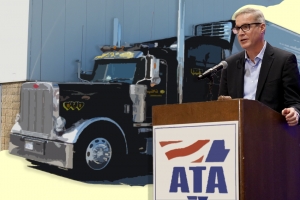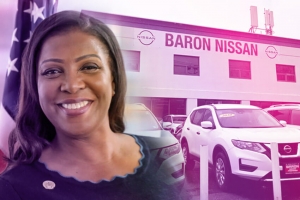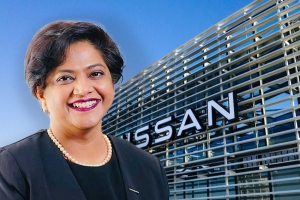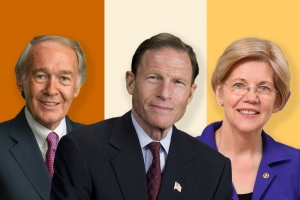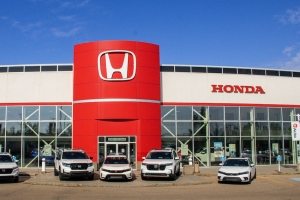
Trucking Group Criticizes EPA Rule
April 01, 2024The American Trucking Associations said new emission standards for heavy-duty trucks that were announced last week by the U.S. Environmental Protection Agency have unachievable targets and will carry real consequences for the U.S. supply chain and movement of freight throughout the economy.
“ATA opposes this rule in its current form because the post-2030 targets remain entirely unachievable given the current state of zero-emission technology, the lack of charging infrastructure and restrictions on the power grid,” said ATA President and CEO Chris Spear. “Given the wide range of operations required of our industry to keep the economy running, a successful emission regulation must be technology neutral and cannot be one-size-fits-all. Any regulation that fails to account for the operational realities of trucking will set the industry and America’s supply chain up for failure.”
The EPA announced a final rule, “Greenhouse Gas Emissions Standards for Heavy-Duty Vehicles – Phase 3,” that sets stronger standards to reduce greenhouse gas emissions from heavy-duty (HD) vehicles beginning in model year 2027. The new standards will be applicable to HD vocational vehicles (such as delivery trucks, refuse haulers, public utility trucks, transit, shuttle, school buses, etc.) and tractors (such as day cabs and sleeper cabs on tractor-trailer trucks).
While EPA’s final rule includes lower zero-emission vehicle rates for model years 2027-2029, ATA stated forced zero-emission vehicle penetration rates in the later years will drive only battery-electric and hydrogen investment, limiting fleets’ choices with early-stage technology that is still unproven.
“The trucking industry is fully committed to the road to zero emissions, but the path to get there must be paved with commonsense,” Spear said. “While we are disappointed with today’s rule, we will continue to work with EPA to address its shortcomings and advance emission-reduction targets and timelines that are both realistic and durable.”
A recent study commissioned by the Clean Freight Coalition highlighted the significant infrastructure investment needs to electrify the nation’s medium- and heavy-duty vehicle fleet, and a recent report from the American Transportation Research Institute identified the many challenges facing commercial-vehicle electrification in the areas of U.S. electricity supply and demand, electric vehicle production and truck charging requirements.
NY Announces Settlements with Nissan Dealerships
April 01, 2024New York Attorney General Letitia James announced settlements worth more than $1.9 million with five Nissan car dealerships in New York City and on Long Island for overcharging over a thousand New Yorkers who wanted to purchase their leased vehicles at the end of their lease term. An investigation by the Office of the Attorney General found that the dealerships added junk fees or falsified the price of vehicles between 2020 and 2023. The agreements require the dealerships to pay more than $1.6 million in restitution to more than 1,100 consumers and a civil penalty of $340,000.
The OAG opened an investigation into five Nissan dealerships—Baron Nissan on Long Island, Nissan of Westbury on Long Island, Nissan of Kings in Brooklyn, Nissan of Queens, and Nissan of Staten Island—after consumers reported they were being overcharged and given inaccurate receipts. The investigation found that each of these consumers leased their Nissan cars under an agreement that gave them the option to purchase the vehicle for a set amount after the lease term ended.

But when the consumers returned to the dealerships when their leases were up to buy their car, the dealerships substantially overcharged them. The dealers either added miscellaneous “dealership fees” or “administrative fees,” or inflated the vehicle’s price on the invoice given to the consumer. In some instances, customers were overcharged as much as $7,000 on an $18,000 vehicle.
The OAG investigation also revealed that the dealerships provided customers with deceptive invoices. These included misrepresenting illegal upcharges as government fees, such as a $37 state inspection fee that dealers charged as $300, and a $50 title fee dealers charged as $500. New York law guarantees every consumer the right to a complete and accurate receipt for every car sale, yet thousands of examined invoices failed that basic test.
Under the agreements announced today:
- Baron Nissan will pay $204,656.89 to 186 overcharged consumers and a $51,190 penalty.
- Nissan of Kings will pay $437,560.86 to 420 overcharged consumers and a $147,000 penalty.
- Nissan of Queens will pay $608,347.83 to 276 overcharged consumers and a $69,757 penalty.
- Nissan of Staten Island will pay $282,255.61 to 184 overcharged consumers and a $55,200 penalty.
- Nissan of Westbury will pay $102,636.07 to 72 overcharged consumers and a $19,440 penalty.
The penalties paid by each dealership vary based on the number of consumers overcharged and the pervasiveness and severity of the overcharging. The dealers have also agreed to audit all deals between the start of the investigation and the present and will provide additional refunds to overcharged consumers identified in that audit.
Nissan Promotes Communications Exec
April 01, 2024Lavanya Wadgaonkar, currently vice president, Nissan Global Communications, will be promoted to corporate VP and chief communications officer. In this role, she will oversee all of Nissan’s communications activities in Japan and globally, elevating trust and reputation at a critical juncture as Nissan launches The Arc, its new business plan to drive value and strengthen competitiveness. She will also continue in her role as the global champion for DEI responsible for actively promoting a diverse, supportive, and inclusive workplace.
She will report to Makoto Uchida, President and Chief Executive Officer (CEO).
Wadgaonkar has over 28 years of international experience in strategic communications, public affairs, brand management, marketing, and sustainability. She previously led and developed the communications and external and government affairs functions for Nissan Asia & Oceania.
U.S. Senators File Recall Legislation
March 28, 2024Three U.S. senators filed a bill that would require car dealers to repair any outstanding safety recall on used cars before selling, leasing or loaning them to customers.
Richard Blumenthal (D-CT), Edward Markey (D-MA) and Elizabeth Warren (D-MA) filed the bill.
“Whether a car is brand new or used, nobody should be at risk of purchasing an unsafe car,” Markey said in a press release. “And it doesn’t matter if a car is still on the lot or in a driveway, it needs to be made safe.”
The bill specifically addresses safety recalls. According to Blumenthal’s press release on the bill, manufacturers will be required to provide dealers with parts to make the necessary repairs within 60 days or reimburse the dealers.
The bill does provide exceptions, including recall information not being available at the time of the sale, vehicles being sold at wholesale and vehicles being sold as junk.
According to a National Highway Traffic Safety Administration report issued earlier this month, the agency issued 1,000 recalls for vehicles, car seats, tires, RVs and other equipment in 2023. Nearly 35 million vehicles were recalled in 2023.
Honda Dominates ‘Consumer Choice Awards’
March 28, 2024Kelley Blue Book announced the winners of the 2024 Consumer Choice Awards. These awards – formerly known as the Brand Image Awards – are based on annual new-car shopper perception study data. Award categories are calculated among in-market luxury and non-luxury, including truck and electric vehicle EV/hybrid shoppers who plan to purchase within the next 12 months.
“Honda is the major winner in this year’s Consumer Choice Awards, nearly sweeping all of the non-luxury categories and taking home more wins than any other automaker for 2024,” said Vanessa Ton, senior research and market intelligence manager at Cox Automotive, which owns KBB.

This year Honda is named Best Overall Brand, Most Trusted Brand, Best Value Brand, Best Performance Brand and Best In-Vehicle Experience Brand, among all non-luxury automakers. Honda also was named Best EV/Hybrid Brand among all automakers, both non-luxury and luxury. Honda takes home the Best Overall Brand Award for the eighth time in the past 11 years, achieving the highest average scores across all ratings of non-luxury models. In addition, Honda impressively claims the Best Value Brand Award for the tenth straight year.
Ram claims the Best Overall Truck Brand Award for 2024, following five straight years of Toyota winning the honor. Additionally, Dodge wins Best Car Styling Brand among non-luxury automakers for the fifth time in the past six years.
Among luxury automakers, Lexus wins Best Overall Luxury Brand and Most Trusted Luxury Brand. Lexus has notably dominated the Most Trusted Luxury Brand Award for nine years straight, including for 11 out of the past 12 years. Mercedes-Benz brings home two 2024 Consumer Choice Awards for Most Refined Luxury Brand and Best Car Styling Luxury Brand. Porsche reclaims the Best Performance Brand Award. Buick wins Best Value Luxury Brand this year.



